Underused Housing Tax: a major change for homeowners living abroad
On January 1, 2022, the federal government introduced a new tax: the UHT, or Underused Housing Tax. The UHT is calculated by multiplying the assessed value of residential real property by the 1% UHT rate, prorated to the percentage of ownership for the calendar year. The assessed value of residential real property may be established by regulation. Otherwise, the assessed value will be based on the highest property value or the most recent acquisition value.
Who are the individuals and companies targeted by this new tax?
People who are not Canadian citizens or permanent residents are among the key persons or corporations required to pay UHT. A private corporation, headed by a shareholder who is not a Canadian citizen, who is not a permanent resident of Canada and who holds 10% or more of the equity value of a corporation, or 10% or more of the voting rights of a corporation, will be required to pay this tax. In addition to these individuals, there are trusts, partnerships and corporations that do not meet specific criteria set out in Bill C-8.
Key properties subject to this tax include a single-family dwelling with not more than three residential living spaces, a semi-detached or row house, a residential condominium unit and a long-term lease of the land on which a residential building is located.
An example to better understand the impact of this new tax
The following example will help you better understand the financial impact this new tax will have on a residential property owner living outside Canada:
The owner of a condominium in Old Montreal, who has been living in Europe for several years, has been unable to enter Canada for the past two years because of the ongoing pandemic. The municipal value of his residential property is $500,000. With the advent of the UHT, this owner will have to pay a $5,000 tax at the end of the calendar year if he has not been able to reside in his Montreal residence for more than 180 days or if he has not been able to rent it to an eligible occupant.
Exceptions
There are a few exceptions where certain owners are not required to pay the UHT. First, the residential property must meet the definition of “qualified occupancy” for at least 180 days. The owner must also have acquired the residential property during the calendar year. If the owner is deceased, the death must have occurred in the calendar year or the preceding calendar year. The construction of the residential property must be completed before April of the calendar year. Lastly, if the residential property has suffered a disaster or is in a condition considered unsafe that cannot be remedied by the owner, or if major renovations have been made, UHT may not be collected.
All of these exemptions are subject to very specific rules that must be followed whether or not the owner is a resident of the building in question.
The definition of “eligible occupation” has many requirements that must be understood and respected. We invite you to become familiar with them by carefully reading the ins and outs of the UHT on the CRA website
As you can see, the UHT has many parameters and restrictions. If you are a residential property owner living outside of Canada, you should carefully read this article and all of its contents. By doing so, you may avoid an unpleasant financial surprise at the end of the coming year…
Stéphane Lapointe
Mortgage Broker
https://www.planipret.com/fr/courtier/stephane-lapointe/
**The content of this publication is subject to exclusive copyright in favor of Planiprêt – Mortgage Cabinet, which reserves all rights.
